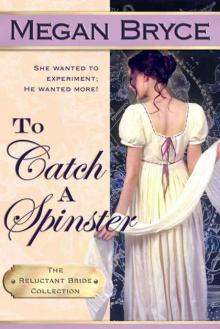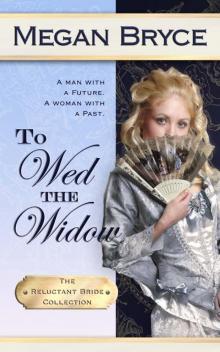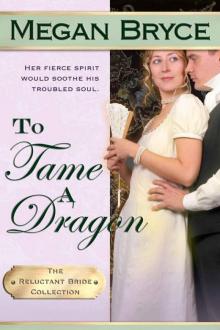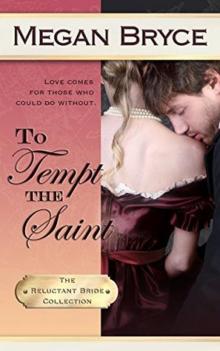- Home
- Megan Bryce
The Reluctant Bride Collection Page 50
The Reluctant Bride Collection Read online
Page 50
And then she opened her eyes and took a step toward him because she had to try anyway. “I wanted to tell you.”
Mr. Moffat snorted. “Lord, how many times have you done this? Every move rehearsed, every contingency accounted for.”
George said, “Is this rehearsed, Letitia?”
Mr. Moffat fingered a silhouette portrait hanging on the wall. “Oh, not Letitia. Not Blackstock. She was Dorine Calmly in Edinburgh. I don’t know who she was before that, yet. I don’t know her real name. Yet. But I believe a man should know the name of the woman who ruined his life.”
Honora watched him walk around the room, fingering every picture. He picked up a book and flipped the pages, and Aunt Beatrice’s hand went to her throat.
George apparently agreed with him. He said, “Your real name.”
She met his increasingly angry eyes and said nothing. She couldn’t tell him, not with Mr. Moffat ready to take that real name to the nearest magistrate. She couldn’t put her aunt and uncle at risk.
George’s hat crumpled between his fingers. “You won’t tell me.”
Honora said softly, “She’s no more real than Miss Blackstock.”
He turned away, heading for the door.
Honora opened her mouth and he stopped suddenly, not turning around but saying over his shoulder, “I wondered, you know. Why you never said it.”
Why she’d never said she loved him. Last night when he’d declared himself.
“Georg–”
“Too late, Twiggy,” he said, and he left.
Miss Blackstock and her entourage had disappeared during the night, Mr. Moffat felt it important to come tell George early the next morning.
The man ranted and railed against the injustice in the world, swore he would get back his money if not his honor, and swore yet again that they would pay. She would pay.
George sat in front of the fire and wondered if he’d feel less tired and more angry in a few months, when the shock had worn off.
He thought maybe if he’d lost money along with his heart that it would have been easier.
Money and a broken engagement, that must have been the plan all along, and he scolded himself for feeling even a smidgen of regret that they hadn’t got to that part.
Rehearsed. Everything had been rehearsed.
And he couldn’t believe it. Not yet.
Collin finally shooed Mr. Moffat out and then set a cup of tea down beside George. He tiptoed out of the room without making any kind of snide remark about Miss Blackstock, and George knew he must look pitiful.
Again.
Love had destroyed him again.
Mr. Moffat returned a few more times but when he could get nothing useful out of George, returned to London to interview anyone She had talked to– George didn’t know what to call her. Not Miss Blackstock, obviously. Not Twiggy, too familiar for a woman he hadn’t been properly introduced to. So she became She.
She.
Woman.
Deceitful, lying thief who’d stolen his heart and hadn’t given it back before disappearing into the night.
George wondered if that had been the plan– to collect as many hearts as she could along with pecuniary payments.
Weeks went by. And then months.
George felt no less pitiable but he must have hidden it well since Collin began to act his normal self again.
Mr. Moffat kept Collin apprised of his progress. George didn’t care, didn’t want to know anything.
But when Mr. Moffat wrote from Bath telling the story of a haberdasher who’d got himself engaged to a woman who had loved hats, a woman who’d lived with her aunt and uncle, a woman who had been so excited to help but whose energetically awful designing abilities had made the haberdasher fear for his livelihood, a woman he still had fond memories of, and a woman he’d paid a nice sum to for breaking off their engagement and ruining every chance for her to have a happy and fruitful life, George was forced to accept the fact that Twiggy hadn’t been the real She, either.
Another part, another character, and it was most likely she didn’t even know who the real She was. Simply became whatever a man needed to secure his love, and then twisted that need until it was impossible for him to actually marry her.
George said dispassionately, “I wonder what she would have turned in to with me,” and Collin gave him a friendly pat on the shoulder and offered him tea.
George sent Collin away with wave of his hand, realizing he must still look a little pitiful.
He must still feel a little pitiful because oh, how he wished she’d been real.
Wished that the woman who’d been everything he needed really existed.
St. Clair,
Forgive my penmanship. The twins insist that day is night and night is day, and will not believe a word I say on the matter. I suspect that one day, I will sleep a whole night through again. . .suspect it, but am far from assured of it.
Have you found a bride for your father yet? No, that’s not quite. . . Have you found a bride for your father to happily object to? . . .You know what I mean. Write to me and tell me all that I am failing to ask.
Elinor sends her love, and don’t snort at me like that.
Your friend, when he remembers his own name,
. . .err, Sinclair?
Seven
It would not be an exaggeration to say that Honora’s father was surprised to see her.
He’d walked into the drawing room with his mouth open and his face turning red. His greeting consisted of, “No notice that you were coming to visit? Has the post stopped delivering and I am unaware of it?”
“My letter must have been lost. I assume that’s what happened to every one of yours these last ten or so years?”
Honora’s stepmother, Fanny, stepped forward to hug her gently and interrupt their feud before it had a chance to start. “You look well, if tired. Was it a long journey?”
Honora nodded. “From London. On the train. My aunt and uncle could use a bath and a long nap.”
Aunt Beatrice and Uncle Arnold could use a few meals and a few weeks uninterrupted sleep.
They’d run from Manchester, leaving what they couldn’t carry and catching the train to Birmingham and then from there, to London.
They hadn’t stopped looking over their collective shoulders until they’d been lost in the crowds and even then they’d hardly dared to venture out of their cheap and seedy lodgings for bread.
They’d argued and worried for weeks. Unsure of where to go. Unsure of just how much Mr. Moffat had found out.
They hadn’t dared contact any of their banks and when the last of their funds ran out, they knew they’d have to leave London. Close an account and leave that day.
And go where no one could accidentally recognize them. Where they could have a warm bed and plentiful food and not spend any money until they knew they were safe.
Home.
And if Honora couldn’t say the word without wanting to both sneer and cry, it didn’t mean she didn’t still have one.
Even if both she and her father wished it otherwise.
But The Very Reverend Charles Kempe was gracious to his dead wife’s sister, their family beneath him but at least respectable, and he was grateful to them for taking over the care of his eldest daughter after her fall from grace.
He said to them, “You are welcome to stay while you are in York.”
“How very welcoming you are, Father. I thank you for your condescension.”
He pinched his lips together and she said quite convincingly, “We won’t stay long. Adventure awaits us in Brighton but when I saw the train now came to York. . . I wondered what else had changed.”
Not him, she didn’t have to say.
Fanny took the older couple in hand, directing the housekeeper to prepare a room and send a tray up, and it was then that eleven-year-old Temperance came rushing through the still open door and skidded to a halt. She blinked and blinked, staring at Honora hopefully. Her blond hair fell in r
inglets down her back and her blue eyes were framed with long lashes.
She was beautiful, like her mother, and though Honora hadn’t seen her since she was a toddler, she’d been described enough by her jealous younger sister.
That sister, ten-year-old Chastity, rushed in just behind her. Brown hair, brown eyes. Not beautiful but her inquisitive personality made up for it.
She was the one to ask, “Honora?”
She was the one to jump forward, to wrap her arms around the sister she’d only ever written to, only ever been told about.
And then Temperance came forward, too, and Honora could drop to her knees, squeeze the two young girls in return, and wonder how she would ever be able to force herself to leave them again.
Aunt Beatrice and Uncle Arnold retired gratefully and her father escaped his female brood the moment he could, but the girls hung on her and when Honora collapsed onto the nearest piece of furniture, Chastity squished herself between Honora and the arm of the sofa, refusing to move away.
Honora didn’t mind, not in the least, even when Chastity turned to scowl at her and say, “You forgot my birthday this year.”
“I am sorry, my darling. It was last week, and I did not forget, but the packing” –the rushed and fearful packing– “forced it completely from my mind. I will make it up to you now that I am here.”
She’d written every birthday since she’d left. From Bath, from Edinburgh, London, even Wales. When they had been far too young to even realize that she had left, that she had even existed, and Honora had always wondered if her father and stepmother told the children about her at all.
But as they got older, the return letters from her stepmother began to include snippets from the girls, and then snippets written by the girls themselves, and then individual letters that Honora had to assume never saw a parental eye.
Temperance complained about Chastity, and Chastity complained about Temperance, and Honora had known that they were truly sisters. That they were both loved and cared for. They were both safe and fed and warm.
Temperance, on Honora’s other side but not squished against her, said, “Was Manchester a grand adventure?”
“Err. . .”
Nine-year-old Faith, her hair blond and her eyes a warm chocolate brown, leaned against her mother’s legs and said, “Did you find a husband?”
“I wasn’t looking for one.” And then she paused because all three of her young sisters looked disappointed. “But yes, I did find someone.”
Chastity jumped up and grabbed Temperance’s hand, pulling her from the sofa and dancing around the room with her.
“Did you dance with him?”
Temperance tried to keep up and say at the same time, “Was he handsome?”
They laughed at each other and at the idea of Honora dancing with a man.
Honora said over the laughter, “No. Handsome men are too much bother.”
“Oh.”
“But he wasn’t ugly, either. He was normal looking. A man you would walk by without tripping over your own tongue.”
They flopped onto the floor in front of her, excited and wistful, and seven-year-old Frederick Charles sat down cross-legged next to them. He looked like a little miniature version of their father, brown hair and brown eyes, and Honora could only be thankful that his appearance made Chastity look less like a changeling.
Fanny moved closer, joining Honora on the sofa and putting Faith between them. “Is this why you’ve finally come home, Honora? To get your father’s permission?”
Honora looked down at the ten-year-old sister who was not a sister and didn’t look at her stepmother.
“No.” She sighed theatrically. “Because I do not have a love story to share with you, only a tragedy.”
Freddy’s eyes got very round. “Did he die?”
“He did not die. He was a troll. A sour, grumpy troll and he is still living under the bridge where the beautiful princess found him.”
Beautiful, blond Temperance looked skeptical. “Was the beautiful princess you?”
Honora leaned forward and spoke so softly that the children had to scoot closer to hear her.
“There once was a not-beautiful-but-not-ugly princess who loved picnics. Especially picnics on bridges with her feet dangling over the edge and water rushing beneath her. And every week she would find a new bridge and eat her bread and cheese and smoked ham and listen to the loud water. So loud it drowned out the rest of the world.”
Faith jumped from the sofa to sit with her siblings and Honora said a little more loudly, “But one week, just as she was settling into a comfortable position, a grumbling at her feet interrupted her solitude and before she could jump up and run away, a large head poked out from beneath the bridge. It was a troll!”
The children jumped, and Temperance gasped, “Was he hideous?!”
Chastity squealed. “Did he smell?!”
“Yes. And of course. And he had a large bogie dangling from his nostril.”
All three girls shrieked and Freddy laughed hysterically and Fanny shook her head. “Honora.”
“He’s a troll. It’s de rigueur. And before the troll had even come all the way out from under the bridge, he snatched the princess up in his large, roughly calloused hand.”
Temperance covered her mouth and mumbled, “Did she faint?”
“Did she faint?! She poked him with her parasol! And said, ‘You do not scare me, you grumpy sour troll.’”
Chastity put her arm around her sister and said, “It’s okay, Temp. The princess really was scared, she just didn’t want the troll to know,” and Honora blinked and then looked down into her lap.
So that no one could see that she really was heartbroken over what she had given up. That she just didn’t want anyone to know.
Her stepmother covered her hand and squeezed, and Honora cleared her throat and channeled perky Miss Blackstock so she could finish her story.
“Well, the troll roared at the princess and he puffed his trolly breath in her face and she poked him again with her parasol. ‘Stay back, Troll,’ she said. ‘And kindly put me down this instant.’”
“Did he?”
“No. He didn’t. But he was a troll, so the princess wasn’t at all surprised. And looking down into the rushing water beneath her, she realized that she had come for a picnic by the river and here she was, by the river, so she climbed into a comfortable position in the troll’s hand, poking with her parasol until she’d made a nice flat area, and then she set out her lunch.”
Freddy looked impressed. “Right there in the troll’s hand?”
Honora nodded. “And the troll watched her with a stupid, confused look on his face because he’d never met anyone who wasn’t afraid of him before.”
Temperance knotted her eyebrows and Honora amended, “The troll had never met anyone who didn’t act afraid of him before, not even when his stomach grumbled loud enough to make the bridge shake. And when he lifted his hand up to his nose and sniffed her freshly baked bread, the princess whacked him on the nose.”
Her stepmother murmured, “I had no idea a parasol could be so useful a weapon.”
“Then the princess said to the troll, ‘I suppose you will want to share my picnic,’ and he replied, ‘I suppose I could just eat you.’
‘Well, it is my favorite smoked ham so let me think about it for a moment,’ she said, and the troll laughed at her wit.”
Honora stopped, remembering her sour troll trying not to laugh, and Faith said, “She should share.”
Honora laughed. “She should, and she did. The fairly ordinary princess broke her bread in two and offered half her ham, and they ate their picnic, both of them surprised to find the other was good company. And when the food was all gone, the troll grumbled that it hadn’t been enough.
“‘No,’ the princess said because it hadn’t been. ‘Should I come again next week?’
“And the troll sighed and huffed and puffed and finally agreed that she could come. The princess
nodded and packed up her basket and when she was down on the ground once again sniffed and said, ‘I would have come anyway.’”
Temperance said, “Did the troll want to marry her?”
“Of course he did. She was a princess, and she made him laugh when no one else could. And every week the princess brought her picnic to the bridge and they slowly fell in love.”
The girls sighed and Fanny smiled and Freddy made a face, and Honora said, “But the princess had a secret.”
Her stepmother shifted in her seat and Honora leaned forward again. “The princess wasn’t really a princess. She was a witch! And when the troll discovered this, he covered his eyes so he wouldn’t have to see her.”
Chastity crossed her arms. “But he’s a troll. That’s no worse than a witch.”
“Maybe if she hadn’t lied it would have been okay. But there is one thing no troll will ever forgive, and that’s lying.”
The children thought about that and Temperance asked fearfully, “Are you really a witch, Honora?”
“I am the worst kind of witch imaginable. The kind of witch who doesn’t visit her sisters and brother. The kind of witch who forgets birthdays.”
“The kind of witch who doesn’t bring presents?”
Honora nodded and whispered, “I am that kind of horrible witch.”
Chastity jumped up. “But you said you would make it up to me.”
“I will. And next month it is Temperance’s birthday and she will be eleven and I will send a present and not forget because even if I am a witch who doesn’t bring presents, I will always be a witch who sends presents.”
Temperance said quietly, “Does that mean you’re not staying?”
Honora nodded and Faith said, “I wish you’d stay forever and get married and have babies and I would hold them for you.”
“Would you?”
“Yes.”
“Well. If I ever get married and have babies, I will let you hold them.”
Chastity said, “And stay here, in York?”
“If I can.”
“When you’re married, you won’t have to live here with Papa and then maybe you won’t make him so angry and he won’t make you so angry.”

_preview.jpg) To Tame A Lady (The Reluctant Bride Collection)
To Tame A Lady (The Reluctant Bride Collection) Boring Is The New Black (The Fashionista and The Geek Book 1)
Boring Is The New Black (The Fashionista and The Geek Book 1) It's Only Temporary - The Complete Collection
It's Only Temporary - The Complete Collection The Tie's The Limit (The Fashionista and The Geek Book 2)
The Tie's The Limit (The Fashionista and The Geek Book 2) The Reluctant Bride Collection - The Complete Box Set
The Reluctant Bride Collection - The Complete Box Set Some Like It Charming (A Temporary Engagement)
Some Like It Charming (A Temporary Engagement) To Catch A Spinster (The Reluctant Bride Collection)
To Catch A Spinster (The Reluctant Bride Collection) Boring Is The New Black
Boring Is The New Black To Wed The Widow
To Wed The Widow To Tame a Dragon
To Tame a Dragon To Tempt the Saint
To Tempt the Saint The Reluctant Bride Collection
The Reluctant Bride Collection The Tie's The Limit
The Tie's The Limit Some Like It Hopeless (A Temporary Engagement)
Some Like It Hopeless (A Temporary Engagement)